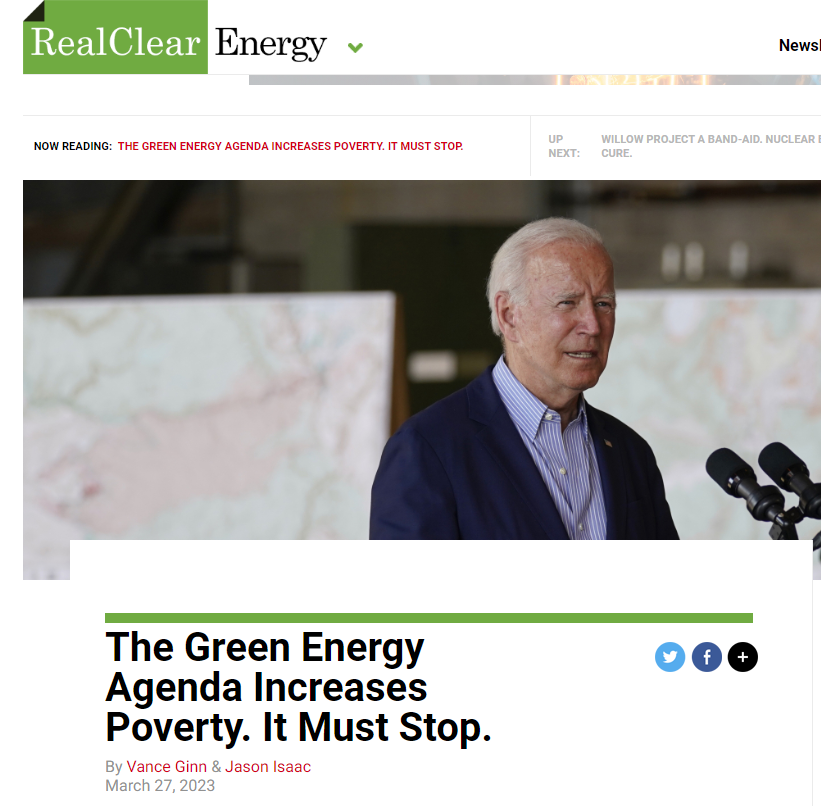|
The push to ditch reliable energy is out of control. Politicians are manipulating the energy market through subsidies, tax breaks, and environmental, social, and corporate governance (ESG) initiatives in regulations and government pensions.
It’s also concerning that the “big three” investment institutions, which collectively hold over $20 trillion in assets, too often coerce the companies in which they have significant investments to bend the knee to their big-government political ideology, such as complying with the Paris Climate Accord. Sadly, the result of this virtue signaling to prop up unreliable wind and solar comes at high costs for little benefits—if any benefits at all. And more than hemorrhaged taxpayer dollars are at stake: this green energy agenda increases poverty. It must stop. While the media is constantly ringing alarm bells about the always-changing climate, not enough people are alarmed by the economic trade-offs these unreliable green energy initiatives create. But that requires an honest comparison of the climate change risks versus the economic costs, both of which impact future generations. The International Energy Agency (IEA) finds that there were an expected 20 million more people without electricity globally, totaling 775 million people, in 2022. Many of these people are in sub-Saharan Africa, who are facing increasing hardship due to rising costs for food, fuel and other necessities. This situation is made worse by the left’s insistence on unreliable sources of energy that have forced many Europeans to use wood for stoves and heat instead of much cleaner-burning natural gas. Forcing some of the population to depend on energy sources that don’t work ultimately pushes them into hardship and poverty when those methods fail. Texas experienced this problem in a tragic way two years ago during its historic weather event of freezing temperatures and accumulations of ice and snow that left thousands without power, contributing to an estimated 246 deaths. Such a tragedy should never have happened in America’s energy capital, but these are gambles that politicians take when offering subsidies to unreliable variable energy providers that make it difficult for reliable thermal energy to compete, even though thermal energy is the most stable and reliable form. Fortunately, Texas let a property tax break for businesses called Chapter 313 expire in December 2022. That tax break was often used by renewable energy companies to lower their tax bills (and operating costs). Still, some already want to bring Chapter 313 or something like it back. This should be a non-starter. That’s not to say that climate change couldn’t have consequences, but considering the projected minimal benefits from expensive initiatives by politicians and the need for adaptation, the trade-offs seem hardly worth it. And this says nothing of the benefits of more CO2, which is necessary for life on earth. More broadly, if every signatory of the Paris Accord, including India and China, decarbonized by 2050, the temperature differentiation by 2100 would be just 0.17 degrees. And according to climate change activists, the cost to get there could be as much as $21 trillion through 2050. Businesses attempting to go green would be forced to raise their prices significantly to make a profit, a normally tough task that’s only made harder by present-day sky-high inflation. But if subsidies and other artificial means of skewing the energy market continue, then businesses that don’t receive subsidies and can’t afford to “go green” simply won’t be able to compete. This would result in a massive reallocation of resources that will contribute to less economic growth, more poverty, and less energy stability. Not only can over-dependence on unreliables lead to hardship, but it often counteracts the green energy innovation it wants to spur. One of the reasons the U.S. is so prosperous is that it is the most responsible and efficient at producing and utilizing energy, having reduced criteria pollutants 78% in the last 50 years. And what has supported this is our wealth acquired via free-market capitalism. That’s why the best thing for activists and politicians seeking improved adaptation to climate change is to get out of the way and let the free markets, meaning free people, work. Subsidies, tax breaks, ESG initiatives, and other hindrances to a well-functioning market process should be abandoned. When politicians push funds into green energy agendas, often to win votes through virtue signaling, precious scarce taxpayer resources are wasted. Markets work, but we have to let them. Individuals and entities should be left alone when choosing which energy sources to direct their funds and business. Otherwise, the outcome is less prosperity and more poverty. There is a better way. Originally posted at Real Clear Energy.
0 Comments
Leave a Reply. |
Vance Ginn, Ph.D.
|


 RSS Feed
RSS Feed